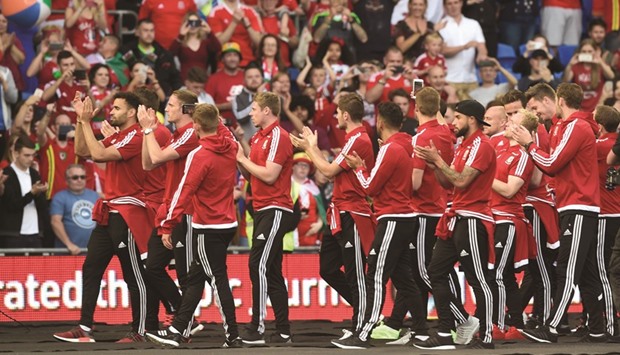Welsh star Gareth Bale and his teammates paraded through the streets of Cardiff packed with an estimated 200,000 fans raucously cheering them as they returned from their Euro 2016 heroics.
Having exceeded even the wildest dreams of the Welsh—more used to seeing their rugby team triumph—and exposed England’s manifest failings at not even reaching the quarter-finals, the semi-finalists were expecting a good turnout.
However, the squad—minus midfielder Joe Ledley, who had the weightier matter of his wedding this weekend—were taken aback at the massive turnout which saw their bus top parade take far longer than expected from Cardiff Castle to Cardiff City Stadium.
The bus was emblazoned with the phrase ‘Diolch (Thank you). Together We Are Stronger’.
The Welsh squad—who had already been feted for reaching the Principality’s first major finals since the 1958 World Cup—had earlier landed at the Cardiff Bale Airport, named in the Real Madrid forward’s honour for the day. The stadium was packed to the brim with 30,000 fans who also had the bonus of Welsh band Manic Street Preachers, who wrote and sang the official Wales Euro 2016 anthem.
Wales will become the top-ranked home nation on the back of their success at the Euros. They are seemingly set to climb into the top six less than five years after being down in 117th position.
Bale, who eventually had to come second best to Real Madrid teammate Cristiano Ronaldo and his Portugal side in the semi-finals, said the fans had been like an extra man.
“To get a welcome like this was incredible. It shows how amazing our fans are,” said the 26-year-old, who scored three goals in the finals.
“The support we’ve had has given us that extra confidence to move on to the next level. Everything we’ve achieved we could haven’t done it without everyone here.
“We fought hard to qualify, all through the games we kept progressing and getting better as a team. We knew what we were capable of after getting to France, we said we didn’t want to make the numbers up.”
Bale couldn’t resist a final dig at England, whose come from behind win over the Welsh in the group stage was a false dawn for them as they went out in the last 16 to unheralded Iceland 2-1. “We wanted to give it a real go—and we got ahead of the English!” said Bale.
They started the competition as big outsiders, but ended up winning a group which contained England, Slovakia and Russia.
Wales then beat Northern Ireland and Belgium, second in the FIFA world rankings, in the knock-out stages before losing to Portugal.
Coleman to call time on Wales job after 2018 World Cup
Chris Coleman, basking in the success of Wales’s run to the Euro 2016 semi-finals, said the upcoming 2018 World Cup campaign will be his last as manager.
The 46-year-old, who took Wales to their first finals since the 1958 World Cup and then oversaw a superb campaign only ended on Wednesday by a Cristiano Ronaldo-inspired Portugal, said he would have been in the job long enough.
“I am sure this will be my last campaign whether we qualify or not (for Russia),” said Coleman, whose contract runs to the end of the next World Cup, with his team playing their first qualifier at home to Moldova on September 5.
Wales’s success has seen Coleman linked with a return to club management, but he dismissed that happening any time soon. “That will be six or seven years in the job, which is a long time. So I think this will be my last hit at it so I will give it my best shot, but I would not consider going anywhere else,” he said. “I want to see this through. There’s success in this team, I think, because they’re at a good age. But I’ll certainly give everything I’ve got in this next campaign. I’ll make sure they do.”
Coleman, whose club managerial experience had taken him from England to Spain and Greece yielding little in the way of results, only took up the role in January 2012 after the tragic suicide of his childhood friend Gary Speed, who was Wales’s manager at the time of his death.
Five months earlier, Wales had fallen to their lowest world ranking of 117th and, despite making the worst start of any Wales manager with four defeats from his first four games, Coleman is now guiding his country through its most successful era.

Wales players applaud fans at Cardiff Stadium after their return from Euro Championships on Friday. Wales lost to Portugal in the semi-finals. (Reuters)
